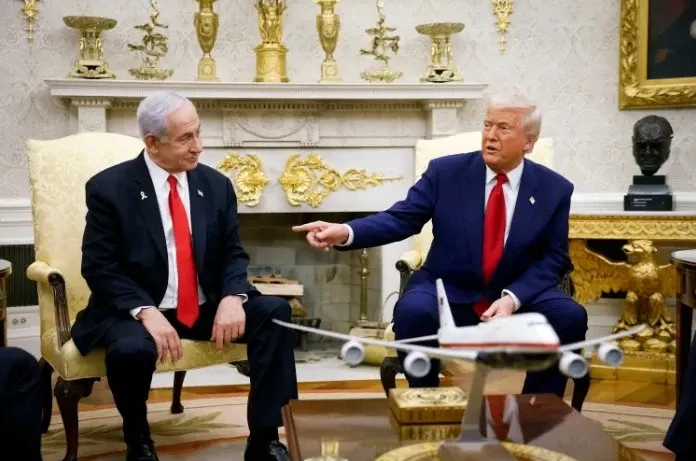Is the US on High Alert Due to a Possible Israeli Strike on Iran?

Synopsis
Key Takeaways
- US on high alert due to fears of an Israeli strike on Iran.
- Personnel adjustments being made in the Middle East by the US government.
- Escalating tensions pose risks of military conflict.
- Iran's warnings indicate a readiness to respond strongly.
- Diplomatic negotiations remain critical to avoid escalation.
Washington, June 12 (NationPress) The United States has reportedly escalated its alert status amid increasing fears regarding a possible Israeli strike on Iran's nuclear sites, according to local media.
The Trump administration is concerned that Israel might proceed with a unilateral action without the approval of Washington if negotiations between the US and Iran break down, as highlighted by the Washington Post.
President Donald Trump, commenting on the matter on Wednesday, revealed that US personnel are being repositioned from certain areas in the Middle East, specifically Iran, due to the rising threat of conflict.
"They (US personnel) are being moved out because it could be a dangerous place, and we will see what happens... We have given notice to move out," Trump told reporters.
The US State Department has also allowed some diplomatic staff to exit Iraq, while the Pentagon has permitted military families to voluntarily leave from American bases throughout the region.
This increase in security measures emerges as prospects for a nuclear agreement between Washington and Tehran continue to diminish, raising fears of another military clash in the Middle East following the recent Israel-Hamas conflict.
Trump reiterated his firm position on Iran's nuclear aspirations, asserting, "They can't have a nuclear weapon. Very simple. They can't have a nuclear weapon. We're not going to allow that," when questioned about the viability of diplomatic solutions.
Last month, Axios reported that Israel was gearing up for a swift strike on Iran in the event that US-Iran discussions faltered.
Trump has previously threatened military intervention against Iran should nuclear negotiations falter, and in an interview with the New York Post earlier on Wednesday, he admitted he was becoming "less confident" that Tehran would agree to cease uranium enrichment, one of the pivotal conditions set by the US.
In recent months, US intelligence officials have expressed rising worries that Tel Aviv might launch a strike on Iran's nuclear facilities without prior notification to Washington.
In retaliation, Iran has warned that any Israeli attack, given the US's role as Israel's primary military and political ally, would result in immediate repercussions for the United States.
In a post on X on Thursday, the Iranian government declared, "We are Ready."
Iranian Defence Minister Aziz Nasirzadeh issued a stern warning on Wednesday, stating that any aggression against Iran would provoke retaliatory strikes on US bases situated in the Middle East.
In anticipation of potential fallout, Washington has instructed US embassies within Iran's strike range -- including those in the Middle East, Eastern Europe, and North Africa -- to activate emergency action committees.
These missions have been directed to report back on security measures to minimize potential risks. The State Department has reportedly also permitted voluntary departures from missions in Bahrain and Kuwait.
This precautionary strategy led Secretary of State Marco Rubio to update the global travel advisory on Wednesday, stating, "On June 11, the Department of State ordered the departure of non-emergency US government personnel due to heightened regional tensions."









